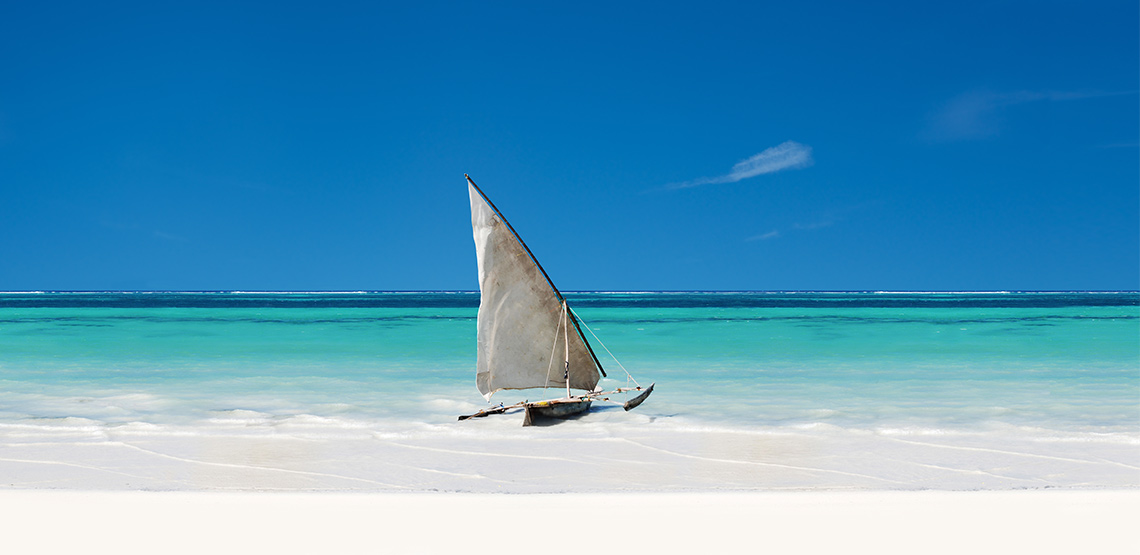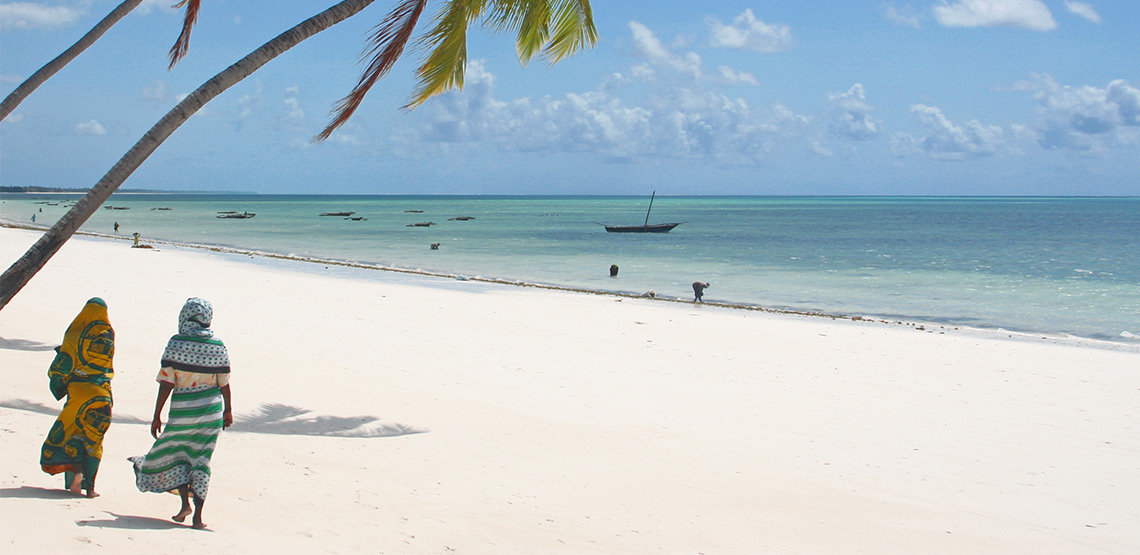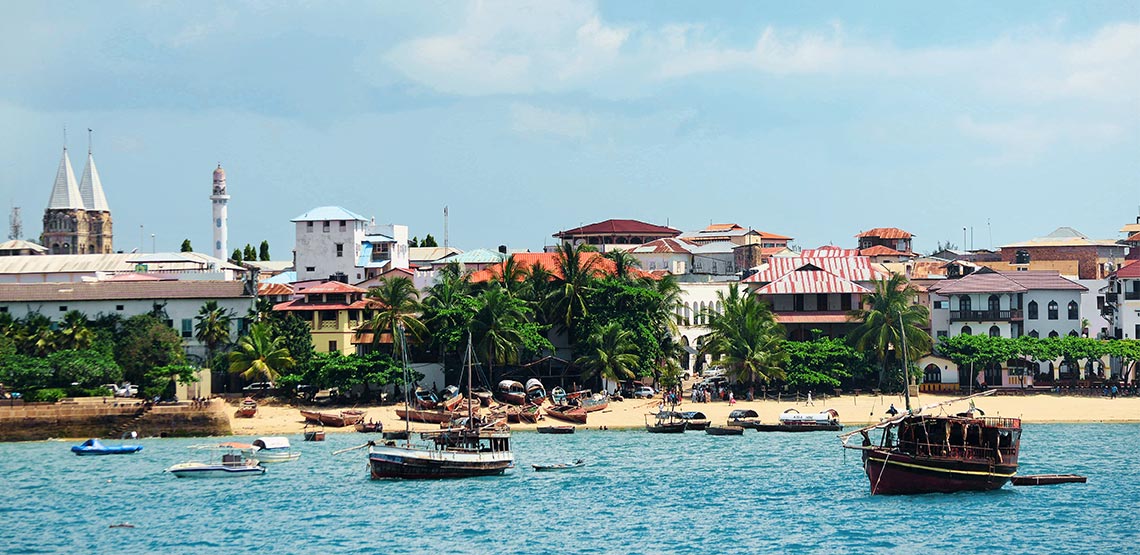Discover an African Island Paradise: A Guide to Visiting Zanzibar
Sunshine, Spice and a Sultry Sea Await You in Zanzibar
The Spice Island has more than a little mystique about it. A mixture of Arabic, Indian and European influences, mingled with vast white-sand beaches and laid-back Tanzanian culture make Zanzibar an enticing destination. With a wealth of history and adventure activities to boot, Zanzibar is so much more than just an island escape.
Here’s what you need to know about Zanzibar tourism.
Top Things to Do in Zanzibar
Relaxation, history or adventure? You can find a little bit of everything in Zanzibar.
Explore the Streets of Stone Town
Whether arriving by water or air, Stone Town will probably be your first stop in Zanzibar. It’s worth spending at least one night here so you have ample time to stroll the narrow streets, taking in the colorfully dressed women and markets overflowing with exotic foods and spices.
Don’t miss the Zanzibar Coffee House, or the chance to sample Zanzibar pizza at the Forodhani Gardens night market.
Kitesurf in Paje
On the east coast of the island, Paje has an impressive beach that stretches for miles. It also has extreme tides, so you could be either faced with a lagoon-like stretch of sparkling blue water, or an expanse of seaweed-strewn white sand. The warm, shallow waters make this the ideal place to learn kitesurfing.
Go Dolphin Spotting in Kizimkazi
A popular activity is going on an early morning dolphin watching tour, where you will have the chance to dive into the water with the playful critters. They won’t exactly be splashing around with you, but you’ll still get the chance to see both humpback and bottlenose dolphins swimming in the wild.
Go on a Dhow Cruise in Nungwi
The northern village of Nungwi is a favorite beach spot. Off the palm-lined beach is a magnificent coral reef teeming with colorful fish, a tidal lagoon that is home to hawksbill turtles, and rows of the traditional dhow boats. Hop aboard one for a sunset cruise with a few snorkeling stops along the way.
Relax on Prison Island
A small island about half a mile long, Prison Island makes a great day trip from Stone Town. You can sunbathe, snorkel or just hang out with the massive Aldabra tortoises — the only residents of the island — as they lumber around.
Visit the Zanzibar Slave Chambers
Visiting the slave chambers will give you an important glimpse into the the ugly business of black market slave trading in the late 1800s. The Mangapwani caves are where slaves were hidden after the official closure of the slave market in 1873. After being held here they were illegally smuggled out to waiting boats, then shipped off for sale.
What to Expect When You Travel to Zanzibar
Even for experienced travelers, Zanzibar can hold a few surprises. Here are a few simple tips to help you prepare for your trip.
Dress Conservatively
The population of Zanzibar is overwhelmingly Muslim. This means locals dress conservatively, and while there is no problem wearing shorts to the beach you should try to cover up a little when walking through town, and never stray away from the beach wearing just your swimsuit.
Learn Some Swahili
Impress the locals with a few words of Swahili. “Jambo” is the most common greeting in Zanzibar (you also reply with jambo). “Habari” means “how are you” and the normal response is “nzuri” (good). You’ll also hear the words “hakuna matata” used a lot, as well as “karibu”, which means welcome. Another useful word is “asante” (thank you).
Always be Friendly
When on the beach in Paje or Nungwi, Masai will probably approach you and try to sell you local souvenirs. It can get frustrating constantly fending them off, but in Tanzanian culture greetings and a friendly nature are important – it’s easiest to nod and smile, then politely tell them you aren’t interested.
How to Help with Poverty
It’s common for small children to run up to tourists and try to grab whatever is in your hand, so keep a close hold of your sunglasses, drink bottles, or whatever else you may be carrying. There is widespread poverty on Zanzibar, and while you may be tempted to give these children some money or gifts, a more sustainable approach is to donate to a local charity instead.
Help Reduce Waste
Waste is a huge problem in Zanzibar, as they have no recycling facilities. Try to reduce the amount of plastic you use – for example, take a reusable drink bottle and bag, and say no to straws.
Be Prepared to Haggle
Haggling is normal when you are shopping (don’t expect to see prices on anything) so feel free to try and bargain for prices.
Use Dala Dala for Transportation
Taxis are the easiest way to get around, but also the most expensive. Hop on the dala dala (local bus) for cheap transport anywhere around the island. You may be crammed into a minivan with two dozen other people, but it is all part of the local experience!
From beautiful national parks to tours of your favorite TV show locations, there are so many exciting things to do in New Mexico.
When to Visit Zanzibar
The winter months — between June and October — are the most popular, as the weather is slightly cooler and you will enjoy long sunny days with minimal rain. This is the peak travel season though, so be prepared for inflated prices and crowded beaches, especially in July and August.
December through February is also dry and sunny, but has sweltering heat. Avoid the wet seasons in November and from March to May, as it can put a damper on things.
Safety
The pace of life on Zanzibar is slow and peaceful — get used to locals saying “pole pole,” which means take it easy. There is still some risk of petty crime on the island despite the laid-back atmosphere, so be careful to watch your belongings, especially when you are on the beach or wandering around Stone Town.
Leave valuables, your passport or large amounts of cash in your hotel room or in a safe at reception. When walking down a road, walk against the traffic and keep your bag on the side of your body away from the cars. You should also keep your bag hanging loosely off your shoulder — if it is snatched by someone in a passing vehicle, this means you won’t be dragged along with it.
Don’t let these precautions frighten you, though; as long as you stay vigilant, you are unlikely to be the victim of an attack.









